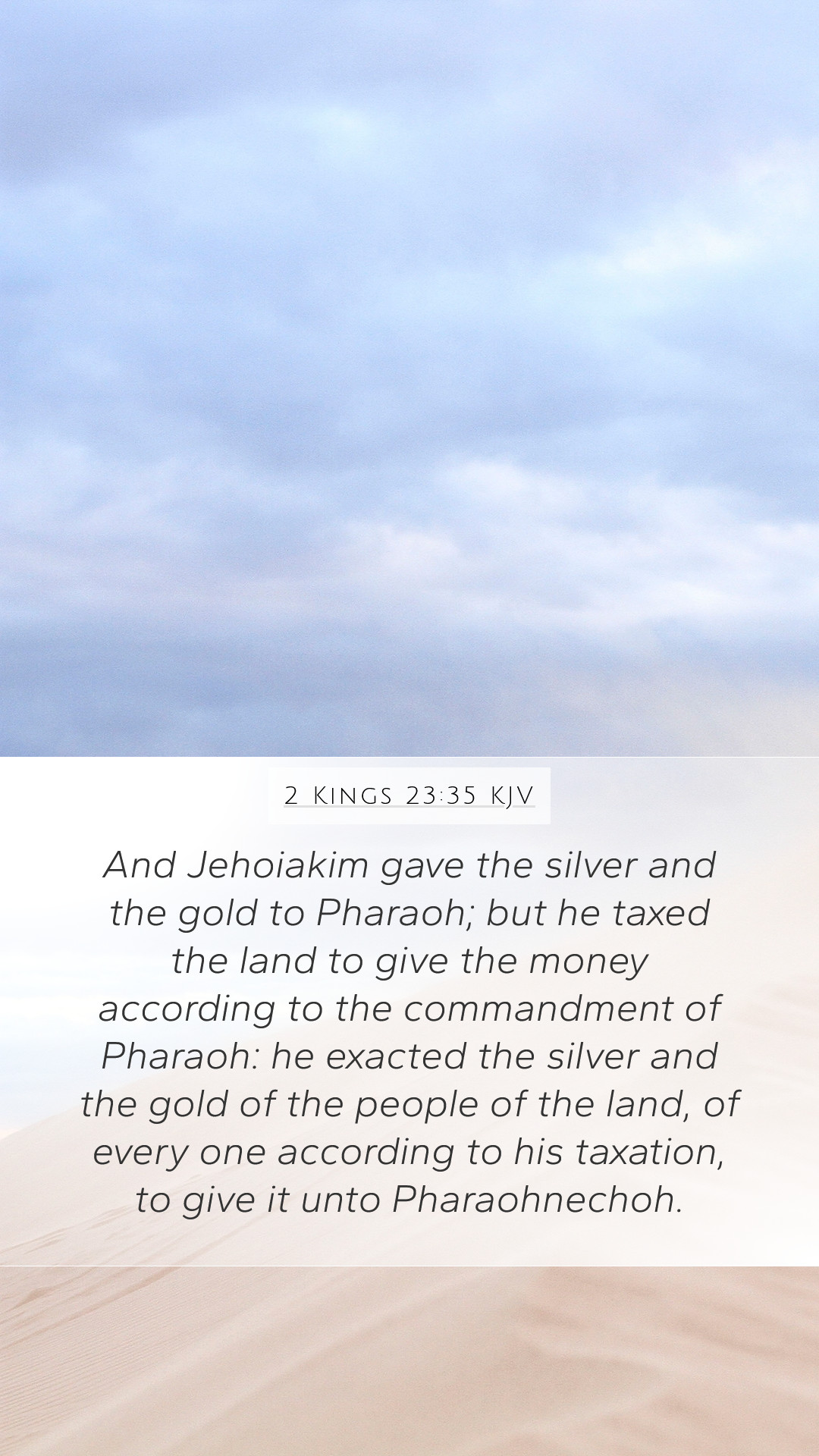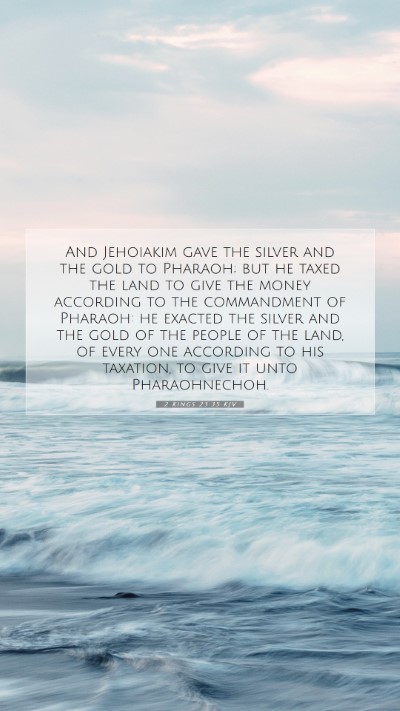Understanding 2 Kings 23:35
When examining the Bible verse 2 Kings 23:35, it is essential to extract its meaning through a combination of interpretations from various public domain commentaries, such as those by Matthew Henry, Albert Barnes, and Adam Clarke. This verse captures a crucial moment in the narrative of King Jehoiakim's reign, and through our exploration, we will gain insights into its significance, relevance, and applications.
Verse Context
2 Kings 23:35 reads: "And Jehoiakim gave the silver and the gold to Pharaoh; but he taxed the land to give the money according to the commandment of Pharaoh: he exacted the silver and the gold of the people of the land, of everyone according to his taxation, to give it unto Pharaoh."
This moment occurs in the historical context of Judah’s political challenges and the Assyrian influence on Israel’s governance.
Verse Interpretation
- Political Context: Jehoiakim’s actions are interpreted as a submission to Pharaoh. Matthew Henry points out that this act signifies a surrender of Judah’s autonomy, seeking favor from Egypt at the expense of the people’s resources.
- Economic Burden: Albert Barnes highlights how Jehoiakim's taxation placed a heavy burden on the people. This decision to gather funds for tribute demonstrates a lack of faith in God, opting for reliance on worldly powers.
- Moral Implications: Adam Clarke emphasizes the moral decline evident in Jehoiakim’s leadership. By prioritizing the king’s greed and aligning with foreign powers, the spiritual welfare of the nation was neglected.
Insights from Commentaries
Examining the insights from these commentaries helps to deepen our understanding of this scripture. Below are key points:
- Jehoiakim’s Leadership: Jehoiakim is portrayed as a king who lacked spiritual resolve, making compromises that pleased human leaders while ignoring God’s commandments (Matthew Henry).
- Taxation as Oppression: The taxation imposed is considered oppressive, revealing the frailty of the nation’s leadership (Albert Barnes). This reflects broader themes of social justice and the responsibilities of those in power.
- A Spiritual Lesson: The reliance on Egypt serves as a reminder for believers today about the dangers of turning to worldly systems rather than trusting in divine providence (Adam Clarke).
Biblical Exegesis
In biblical exegesis, understanding the original language and historical context is crucial for grasping the full meaning of 2 Kings 23:35. The Hebrew terms used in the original text suggest not only financial tribute but also the spiritual decay that comes from aligning with foreign powers over God.
Historical Context
The historical backdrop includes Judah's declining influence and the growing threat from surrounding nations. The decision of Jehoiakim to surrender to Pharaoh is akin to the Israelites seeking a king to be like other nations, revealing a lack of trust in their true King, God.
Application to Daily Life
The lessons drawn from 2 Kings 23:35 offer insights that remain relevant today. Here are some applications for believers:
- Trust in God: Just as Jehoiakim's reign illustrates the dangers of misplaced trust, individuals are encouraged to place their reliance on God rather than worldly leaders or systems.
- Social Responsibility: The economic injustices highlighted in this verse challenge modern believers to advocate for fairness and justice in their communities.
- Spiritual Vigilance: This text calls Christians to remain vigilant against compromising their faith for worldly gain, emphasizing the necessity of prioritizing God’s kingdom.
Conclusion
2 Kings 23:35 serves as a profound reminder of the responsibilities of leadership and the consequences of failing to uphold spiritual integrity. The insights garnered from esteemed commentaries facilitate a deeper understanding of this scripture and encourage believers to reflect on their own lives in the light of biblical truths.
Related Bible Cross References
- 2 Chronicles 36:1-4 - Discussing the reign of Jehoiakim and decisions influenced by foreign powers.
- Jeremiah 22:13-19 - Offering insight into the judgment against kings who oppress their people.
- Isaiah 30:1-3 - Addressing the folly of seeking help from Egypt instead of God.


